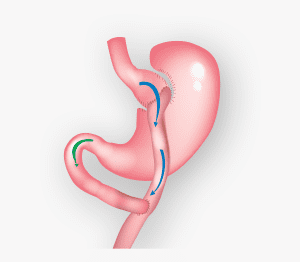Introduction
In recent years, gastric bypass surgery has emerged as a transformative solution not only for weight loss but also for managing Type 2 diabetes. This groundbreaking procedure offers hope to those struggling with both obesity and diabetes, showcasing remarkable improvements in metabolic health.
How does Gastric Bypass help Type 2 Diabetes?

What are the benefits of Gastric Bypass for Type 2 Diabetes patients?
- Rapid Improvement in Blood Sugar Levels: Gastric bypass surgery often results in swift improvements in blood sugar levels. This can lead to a reduction or even elimination of the need for diabetes medication shortly after the procedure.
- Changes in Gut Hormones: The rerouting of the digestive tract during gastric bypass affects the release of gut hormones, influencing insulin secretion and sensitivity. This, in turn, contributes to better blood sugar regulation.
- Long-Term Benefits: Studies have shown that the positive effects on diabetes management post-gastric bypass are sustained in the long term, emphasizing the enduring impact of the surgery on metabolic health.
Who is suitable for Gastric Bypass Surgery?
While gastric bypass surgery offers promising results, it is essential to identify suitable candidates for the procedure. Generally, individuals who meet the following criteria may benefit:
- BMI Criteria: Gastric bypass is often recommended for individuals with a BMI of 35 or higher, especially if diabetes is not well-controlled through other means.
- Type 2 Diabetes Diagnosis: Those diagnosed with Type 2 diabetes, particularly if it is challenging to manage with conventional treatments, may be considered for gastric bypass.
- Commitment to Lifestyle Changes: Success with gastric bypass surgery requires a commitment to significant lifestyle changes, including dietary modifications and regular exercise.

Conclusion
In conclusion, the symbiotic relationship between gastric bypass and Type 2 diabetes presents a beacon of hope for those seeking not only weight management but a transformative solution for metabolic health. As we delve into the nuanced advancements of this medical practice, it becomes evident that gastric bypass offers more than just physical changes; it signifies a profound impact on one’s overall well-being. With further research and continued exploration, the marriage of science and medicine in gastric bypass procedures is poised to redefine the narrative of Type 2 diabetes, providing individuals with a simpler path to a healthier and more fulfilling life.
Disclaimer: The content on this blog is intended for general informational purposes only. It is not a substitute for professional medical advice, diagnosis, or treatment. Always consult qualified healthcare providers for personalized advice. Information regarding plastic surgery, dental treatment, hair transplant, and other medical procedures is educational and not a guarantee of results. We do not assume liability for actions taken based on blog content. Medical knowledge evolves; verify information and consult professionals. External links do not imply endorsement. By using this blog, you agree to these terms.





